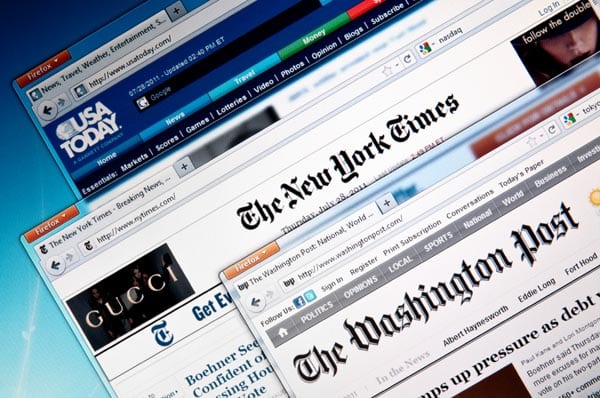The Value of Fact-Checking worldwide of News Online
The prevalence of misinformation in today's on-line news landscape has actually reached alarming levels. Fact-checking organizations play a vital duty in neutralizing this trend. They verify claims and boost the integrity of journalism. The performance of these companies usually pivots on their methodologies and public perception. As audiences browse this intricate environment, the implications of their searchings for may shape the future of news consumption and trust. What does this mean for the honesty of info progressing?

The Increase of Misinformation in the Digital Age
How has the arrival of electronic technology added to the spread of false information? The rapid growth of the net and social networks platforms has assisted in the dissemination of information at an unmatched pace. Customers can share articles, videos, and viewpoints with a mere click, frequently without verifying the content's accuracy. Formulas prioritize astonishing or emotionally charged product, resulting in a spreading of misleading stories that capture interest.
Furthermore, the anonymity afforded by digital systems enables people to spread out false details without liability (stnews.live). Misinformation thrives in resemble chambers, where users are exposed mostly to viewpoints that strengthen their beliefs, better lodging frauds. The saturation of info can overwhelm individuals, making it testing to recognize qualified sources from undependable ones. Subsequently, misinformation has actually become a pervasive problem in the electronic landscape, affecting public opinion and count on legit news sources
The Role of Fact-Checking Organizations
Fact-checking organizations play an important duty in enhancing the integrity of journalism by verifying claims made in report. Their initiatives are crucial in combating misinformation, guaranteeing that precise details dominates in the digital landscape. By holding media outlets accountable, these organizations contribute significantly to informed public discussion.
Enhancing Reliability in Journalism
While false information multiplies in the electronic age, fact-checking companies play a necessary function in enhancing the trustworthiness of journalism. These organizations carefully verify cases made in newspaper article, public declarations, and social networks blog posts, making certain that details shared to the general public is accurate and trustworthy. By giving independent analyses, they offer as an essential source for reporters, aiding them preserve high standards of stability. On top of that, their initiatives advertise transparency in media, cultivating public depend on. As audiences end up being increasingly critical, the existence of trusted fact-checking entities can identify reputable news sources from those that may spread fallacies. Ultimately, the commitment of fact-checking companies to maintain reliability is important for the health of autonomous discussion.
Combating False Information Efficiently
As false information proceeds to spread swiftly across digital platforms, the function of fact-checking companies ends up being increasingly important in the fight for accurate info. These companies act as guard dogs, looking at insurance claims made by public figures and media electrical outlets to guarantee liability. By using extensive study techniques and expert analysis, they verify realities and clarify misleading narratives. Their findings are disseminated with different networks, enlightening the public and promoting important reasoning. Furthermore, collaborations with social networks systems enhance their reach, permitting prompt flagging of incorrect details. As digital literacy grows, the influence of fact-checking organizations is vital in equipping target markets to recognize fact from falsehood, eventually contributing to an extra educated culture.
Just How False Information Affects Public Assumption
Misinformation significantly threatens rely on media, leading target markets to doubt the credibility of news resources. Therefore, individuals frequently are attracted in the direction of outlets that strengthen their present ideas, contributing to the polarization of viewpoints. This dynamic creates a fragmented details landscape, where shared comprehending becomes progressively hard to attain.
Trust in Media

Rely on media has actually ended up being significantly vulnerable in the digital age, where the rapid spread of incorrect info can skew public understanding. As false information proliferates across social media and on-line platforms, target markets typically discover it testing to determine reputable sources from unreliable ones. This unpredictability promotes suspicion, leading several individuals to examine the intentions behind news reporting. Consequently, rely on developed media outlets has actually reduced, as consumers increasingly transform to alternate sources that may do not have strenuous content criteria. This erosion of trust not only impacts specific ideas but additionally threatens the collective ability to take part in notified discussions. Ultimately, the honesty of journalism is at risk, highlighting the vital demand for effective fact-checking to restore confidence in the media landscape.

Polarization of Viewpoints
The raising skepticism toward conventional media has added to an expanding polarization of opinions amongst the general public. False information, usually disseminated with social media and online platforms, plays a considerable function fit distinct ideological separates. Individuals frequently look for out details that aligns with their pre-existing ideas, enhancing their viewpoints while dismissing opposing point of views. This echo chamber effect heightens divisions, causing a fragmented public discourse where consensus ends up being significantly elusive. In addition, sensationalized narratives grow in this setting, better skewing public understanding and fostering mistrust in reliable sources. As polarization rises, the requirement for effective fact-checking comes to be critical to link spaces and promote notified discussions, ultimately making sure an extra natural society efficient in maneuvering complex problems.
Techniques for Effective Fact-Checking
Reliable fact-checking counts on a systematic technique that includes extensive research, verification of resources, and important analysis of cases. A fundamental method is cross-referencing info from several qualified sources to confirm its precision. Fact-checkers usually make use of specialized data sources and archives to trace the origin of particular declarations, ensuring that the reported details lines up with documented proof.
Another essential approach includes looking at the context in which insurance claims exist. Deceptive info can occur from out-of-context quotes or discerning information usage. By examining the wider story, fact-checkers can determine potential prejudices or misinterpretations.
Involving with specialists in pertinent areas can give quality and understanding that enhances the fact-checking process. This collaboration can uncover subtleties that laypeople may ignore - stnews.live. Ultimately, check my blog a regimented method combining these methods promotes an extra informed public, improving the integrity of info shared in the electronic age
The Effect of Social Network on News Usage
Just how has social media changed the way individuals eat news? The appearance of systems like Facebook, Twitter, and Instagram has especially transformed news intake patterns. News is currently distributed rapidly, allowing customers to gain access to real-time updates and engage with web content with sort, shares, and comments. This immediacy has fostered a choice for bite-sized details, usually at the expenditure of thorough analysis.
Furthermore, social networks makes it possible for individualized news feeds, where algorithms curate content based upon user preferences, producing echo chambers that might restrict direct exposure to diverse viewpoints. The duty of traditional news electrical outlets has diminished as people increasingly count on peer suggestions and trending topics. The trustworthiness of details is typically endangered, as sensationalism can overshadow valid reporting. On the whole, social media sites has improved news usage, highlighting rate and personalization while testing the requirements of journalistic honesty.
Empowering Target Markets to Identify Reliable Resources

Furthermore, checking out the authorship and business background of news write-ups can expose potential prejudices. Cross-referencing info throughout multiple trustworthy outlets even more enhances the confirmation procedure. Making use of electronic devices, such as web browser expansions that rate the credibility of websites, can likewise help in determining trustworthy info. By actively involving with these sources and cultivating a critical attitude, target markets can better furnish themselves to discern dependable news resources, eventually cultivating a more educated culture among the intricacies of today's media atmosphere.
The Future of Journalism and Fact-Checking
As the media landscape evolves, the future of journalism and fact-checking faces both tests and possibilities. The surge of digital systems has actually democratized information circulation, enabling varied voices to emerge. However, this has actually also resulted in the expansion of false information, requiring find here robust fact-checking mechanisms. Journalists will progressively depend on modern technology, including AI tools, to verify realities quickly and effectively.
Collaboration between wire service and fact-checking entities is anticipated to reinforce reputation and transparency. Target market interaction will certainly play a vital function, as educated visitors come to be substantial companions in identifying reliable content.
The need for responsibility and accuracy is likely to grow, pushing journalists to copyright high standards in their coverage. Inevitably, the future of journalism might pivot on its capacity to adjust to technological developments while keeping journalistic integrity, making certain that fact-checking remains a foundation of reliable news.
Frequently Asked Questions
How Can I Report False Information I Come Across Online?
To report misinformation experienced online, people can utilize platform-specific coverage tools, offer clear proof, and share the info with fact-checking companies. Involving with neighborhood conversations can likewise help elevate understanding regarding the misinformation.
What Are Typical Signs of False Information in News Articles?
Typical signs of misinformation in news posts consist of sensational headings, lack of credible resources, psychological language, irregular facts, and lack of author qualifications. Viewers should critically review material for these indicators to discern precision.
How Do Fact-Checkers Confirm Sources?
Fact-checkers verify resources by cross-referencing this hyperlink information with reliable databases, consulting experts, and analyzing the initial context of cases. They likewise analyze the dependability of the resources, making sure precise and credible information for public intake.
What Lawsuits Can Be Taken Against Misinformation?
Lawsuits against misinformation might consist of vilification lawsuits, cease-and-desist orders, and regulatory penalties. Sufferers can prosecute through civil courts, while some territories enforce fines or sanctions on systems distributing incorrect details.
Exist Apps for Fact-Checking News On-The-Go?
Many applications exist for fact-checking news on-the-go, including Snopes, FactCheck.org, and PolitiFact. These applications help individuals validate insurance claims quickly, promoting notified decision-making and cultivating a more critical approach to consuming news in real-time.